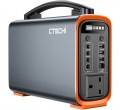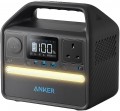Peak power
Some electrical appliances (in particular, units with electric motors - refrigerators, air conditioners, etc.) consume significantly more energy at startup than after reaching the operating mode. For such a load, the peak power of the charging station must be taken into account - its indicator must be higher than the starting power of the load.
USB A (quick charge)
Full size
USB A ports with fast charging support. It allows you to charge your smartphone, tablet or other connected device much faster. The charging process takes place at increased power, and the current and voltage at each stage are regulated in such a way as to remain within the optimal values. However, it should be borne in mind that in our time there are many fast charging technologies and not all of them are compatible with each other.
- The strength of the current. The parameters of the current issued through the USB A fast charging connectors. Note that different voltage and current parameters can be output to different ports of the charging station. This item specifies the current values at a certain voltage (for example, 5 V / 3 A, 9 V / 2 A, 12 V / 1.5 A).
— Power. The maximum power in watts (W) that the charging station is capable of delivering through the USB A fast charging connector to one charging device. High output power allows you to speed up the charging process. However, the appropriate power must be supported by the device being charged - otherwise the speed of the process will be limited by the characteristics of the gadget.
Car cigarette lighter
Built-in cigarette lighter socket with 12 V output voltage in the design of the charging station. Such an interface is in fact a standard "car socket" used to connect various devices to the car's on-board network. The presence
of a cigarette lighter socket (car outlet) allows you to use the charging station as a power source for such devices. The number of sockets in different models can be different - most often there is one cigarette lighter, but occasionally there are options for a couple of connectors.
DC output
The presence of a DC connector (or several such outputs) in the device to power external gadgets with direct current. The standard DC jack is round and has a pin in the center. However, its dimensions may differ in depth and diameter. The voltage output to the
DC output may be different. The most popular options are 18 - 20 V for powering laptops, 12 V for various specialized devices and automotive electrical accessories.
Battery capacity
Nominal
battery capacity, in fact - the amount of energy that is supposed to be stored. The larger it is, the longer the battery life of the charging station will be, all other things being equal. On the other hand, this parameter also affects the dimensions, weight and price of the battery, despite the fact that an energy-intensive battery is not always required. By the indicator of capacity in watt-hours, you can compare batteries with each other.
Charging cycles
The number of charge-discharge cycles that the battery can withstand without significant loss of performance.
In the process of operation, the batteries wear out, which causes their performance to suffer (in the first place, the capacity decreases). Battery life is usually measured in charge-discharge cycles. However, models with the same declared resource are not always equally durable in practice. Different manufacturers may interpret “significant loss of performance” in different ways: for example, one brand indicates the resource up to a 20% decrease in capacity (DOD > 80%), another - up to a 60% decrease (DOD > 40%) Behind the abbreviation DOD worth decoding Depth of Discharge, i.e. discharge depth. Therefore, when choosing, it makes sense to focus not only on pure numbers, but also on other sources - test results, reviews, etc. Also note that battery life can be noticeably reduced if the operating conditions are violated (for example, in case of overheating or hypothermia).
Charging time (socket) ≈
Time to charge the portable power station from a fully discharged state to 100% charge when using the power adapter from a household outlet. This refers to the original battery and standard charger.
Charging time (solar panel) ≈
Time spent on a full charge when using the original panel in bright sunlight. In cloudy weather, the charging time of the device from the solar panel can be strikingly different downwards.
Charging time (cigarette lighter) ≈
The time required to fully (from zero to 100%) charge the battery, provided that power is supplied to the charging station from the car's cigarette lighter socket (12 V).

